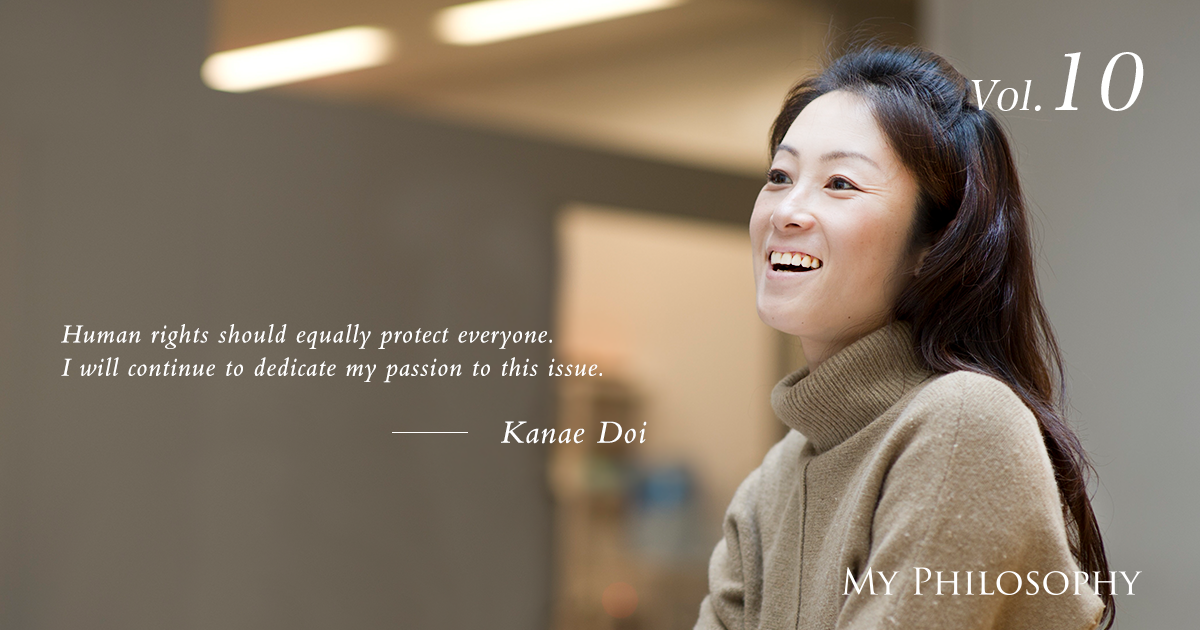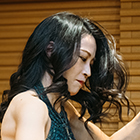
As a human rights lawyer, we spoke with Ms. Kanae Doi, the Japan representative for the international NGO Human Rights Watch, about her dedication to the activities of Human Rights Watch and what she expects from Japanese society.
Profile
Vol.10 Kanae Doi
Japan Representative, International NGO "Human Rights Watch" | Lawyer
In 1996, while studying at the Faculty of Law at the University of Tokyo, Kanae Doi passed the bar exam, becoming the youngest person at the time to do so. In her senior year of college, she volunteered with the NGO Peace Boat and traveled to Eritrea, the newest independent country in Africa at the time, where she spent a year assisting the Ministry of Justice in Eritrea with legislative work. She registered as a lawyer in 2000. Alongside her regular duties, she engaged in legal support for refugees residing in Japan, lobbying for amendments to the Refugee Recognition Act, and participating in campaign activities. In 2007, she obtained her attorney's license in the state of New York. She became a fellow at the New York headquarters of the international NGO Human Rights Watch in 2006, a resident representative in Japan in 2007, and has served as the Japan representative since September 2008. Her recent publication is "The Power to Engage: Toward a World Where Everyone's Dignity is Protected (Makikomu Chikara Subete no Hito no Songen ga Mamorareru Sekai ni Mukete)" (Shogakukan Inc.).
※The titles and other details are as of the time of the interview in November 2011.
Driven by Emotion
In my third year of junior high school, during Japanese language class, we used Michiko Inukai’s book “The Land of Humanity (Ningen no Daichi).” This book is a reportage based on Ms. Inukai’s visits to refugee camps in Asia and Africa since 1979, discussing the actual conditions and the background of these crises. When I read it, I felt as if a shock ran through my body, and as soon as the class ended, I rushed to the library to borrow the sequel, “The Drying Land (Kawaku Daichi),” which I devoured in one sitting. I was shocked by the dire situations ordinary people in Asia and Africa were enduring due to conflicts, and I trembled with anger at the injustices of the world. Since then, I began to think about global issues like hunger, refugee crises, and North-South disparities, and I developed a strong desire to work in helping those suffering around the world.
I believe it’s part of my personality, but even now, when I see people being treated unjustly, I can’t help but get angry and feel compelled to do something. I admire those who never give up their courage despite threats and attempts to revoke their legal credentials and continue to represent those who are persecuted. The emotions that well up inside me might be the driving force behind my engagement with human rights issues.
Human Rights Watch Activities

The mission of Human Rights Watch (HRW) is to stop human rights abuses that are happening right now. We gather information about human rights violations around the world and use it to foster global public opinion in favor of respecting human rights. We also function as a think tank, proposing foreign policy to governments, moving them to eliminate human rights abuses and eradicate the roots of suffering worldwide.
One area I am personally committed to is supporting human rights lawyers in China. Although I act as a “Japanese human rights lawyer,” the situation is not so carefree for lawyers in China and other countries. Many are risking their lives, some are imprisoned, others face severe harassment, and some have been stripped of their legal credentials. Despite these challenges, there are people around the world who are literally putting themselves on the line to defend the rights of others. Supporting human rights lawyers in China, some of whom I know personally, is crucial for addressing human rights issues in China. It is important that they are able to work effectively to resolve these issues.
Economic Development and Human Rights Issues
As you are aware, China has experienced significant economic growth, but this has led to increasing disparities which pose a problem. Often, I am asked if discussing human rights is even relevant in situations of poverty. Isn’t it true that human rights begin with the ability to eat bread? In other words, the belief is that economic growth naturally ensures the protection of human rights, but China serves as one of the counterexamples to this theory. Take, for example, the issue of contaminated blood scandal (contracting AIDS from contaminated blood products) drug-induced AIDS. In Japan, numerous lawyers sought to uncover the problem through litigation against the government, moving public opinion, and subsequently, Naoto Kan became a hero. However, in China, lawyers who raised social issues like the contaminated blood scandal were met with retaliation, including disbarment.
Fundamentally, societal issues should be freely resolvable, and it is unacceptable for a government to hinder this process. Yet, the Chinese government continues to do so. Tens of thousands of people are employed to censor content, and platforms like Facebook and Twitter are inaccessible.
I believe that human rights abuses do not simply diminish with increased wealth. There is no automatic correlation where improvement in one area necessarily results in improvement in the other. Human rights are fundamentally about the rights of each citizen against their state. There is an instinctual desire to protect acquired power, and the belief that suppressing human rights is acceptable to protect personal power persists, even amid economic growth. Therefore, I feel that economic development and the respect for human rights must be considered together.
Donations are an Expression of Empathy.

A significant characteristic of Human Rights Watch (HRW) is that it operates entirely without government funding, relying instead on donations from individuals and private foundations. In New York, where the headquarters is located, HRW hosts an annual charity dinner to raise funds. Tickets for table seats are sold based on donation amounts, and such fundraising parties are commonplace in the United States, where the act of donating is deeply ingrained in society. In Japan, however, making donations is not as common, and many contributions are made anonymously. When Masayoshi Son publicly announced his donation after the Great East Japan Earthquake, I thought it was important not only for the amount but also that it was made publicly. However, some perceived it as a publicity stunt. For example, if Mr. Son were to donate to HRW, it would not only be beneficial for fundraising purposes but would also serve as a message to his friends and acquaintances, potentially inspiring others to act and thus expanding the circle of support.
make a financial contribution; simply posting on Twitter that you support a particular activity can be sufficient. For NGOs, it is a significant message of support when people publicly share which organizations they support. Such individual actions can sway public opinion and move countries towards solving issues. If you feel empathy, I encourage you to take action. I hope that in the near future, Japan’s perception of donations will change, allowing people to proudly make donations under their real names.

As Ms. Doi has already appeared in various media, we decided to approach this interview from a different angle. Listening to her, I was inspired to push myself further. I believe that if Japan’s attitude towards donations changes, it will lead to a more open society and alter Japan’s position globally. I have long been interested in the activities of HRW and will continue to support them both as Interliteracy Inc., and personally as DK Sugiyama. I highly recommend Ms. Doi’s book,“The Power to Engage (Makikomu Chikara)” (published by Shogakukan Inc.).
Editor-in-Chief, “My Philosophy”DK Sugiyama November 2011 at the Human Rights Watch Asia Bureau,Edited by Naomi Kusuda,Photographed by Daiki Ayuzawa






























































































































